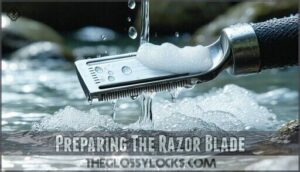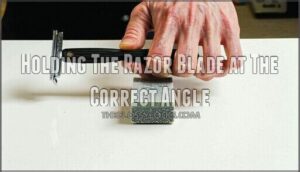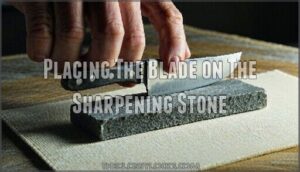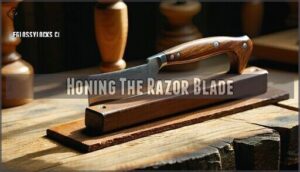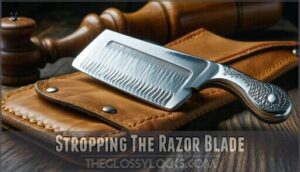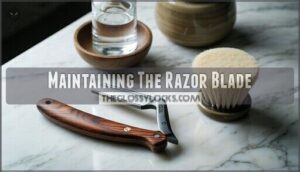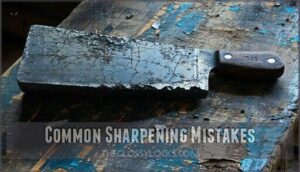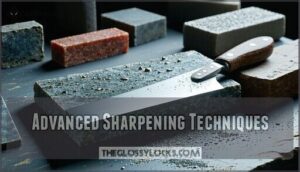This site is supported by our readers. We may earn a commission, at no cost to you, if you purchase through links.
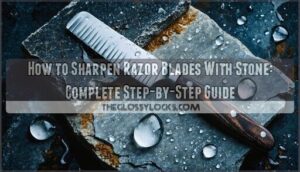
Start by soaking your whetstones for 10-15 minutes, then position your razor at a consistent 15-20 degree angle.
Draw the blade across the stone using light, even strokes, working from heel to toe. Flip and repeat on the other side, maintaining that steady angle throughout.
The key? Patience and consistency beat speed every time. Most folks mess up by applying too much pressure or rushing the process.
Master these fundamentals, and you’ll discover why proper stone technique separates amateur shavers from true blade craftsmen.
Table Of Contents
- Key Takeaways
- Choosing The Right Stone
- Preparing The Razor Blade
- Positioning The Razor Blade
- Sharpening The Razor Blade
- Honing The Razor Blade
- Stropping The Razor Blade
- Maintaining The Razor Blade
- Common Sharpening Mistakes
- Advanced Sharpening Techniques
- Frequently Asked Questions (FAQs)
- How do you sharpen a razor blade?
- How to sharpen a knife razor-sharp?
- How do you sharpen a knife with a sharpening stone?
- How often do you sharpen a straight razor?
- How do I choose a sharpening stone?
- How do you cut a stone with a razor?
- Can you sharpen a blade with a stone?
- How to sharpen a straight razor with a wet stone?
- How to make razor blade sharper?
- How do you sharpen clipper blades with a stone?
- Conclusion
Key Takeaways
- You’ll need to soak your whetstones for 10-15 minutes and maintain a consistent 15-20 degree angle throughout the sharpening process – this angle consistency is what separates amateur attempts from professional results.
- Apply light pressure and let the blade’s weight do most of the work as you draw it from heel to toe across the stone – rushing or pressing too hard will damage your blade and ruin the edge you’re trying to create.
- Progress through different grit levels strategically, starting with coarser stones (1000-4000 grit) for maintenance and finishing with finer stones (6000-8000+ grit) for that razor-sharp polish.
- Complete the process with stropping on leather to realign the microscopic edge and remove burrs – this final step transforms a sharp blade into one that glides effortlessly through hair.
Choosing The Right Stone
Choosing the right stone for your razor blade isn’t rocket science, but it makes all the difference between a smooth shave and a frustrating tug-of-war with stubble.
You’ll want to match your stone’s grit level to your blade’s condition and your sharpening goals, just like picking the right tool for any job.
Types of Sharpening Stones for Razor Blades
When sharpening razor blades, you’ll encounter several sharpening stone types.
Water stones soak in liquid before use, while oil stones require lubricating oil.
Diamond stones cut fastest due to their hardness.
Ceramic stones offer long-lasting surfaces for fine polishing.
Natural stones provide traditional results, though synthetic options offer consistent grit comparison and performance for reliable razor blade sharpening.
Many enthusiasts purchase sharpening supplies online for convenience.
Selecting The Best Stone for Your Razor Type
Your razor’s material determines your sharpening stone choice.
Straight razors need ultra-fine 8,000+ grit stones for smooth edges, while safety razor blades work best with medium 1,000-4,000 grit stones.
High-carbon steel responds well to Japanese water stones, but stainless steel requires harder synthetic stones.
Match your stone material to your razor blade sharpening needs for superior results.
Factors to Consider When Buying a Sharpening Stone
When you’re shopping for a sharpening stone, think of it as investing in your blade’s future.
The right choice depends on several key factors that’ll make or break your sharpening experience.
- Grit Levels: Choose coarse (200-600) for damaged blades, medium (800-2000) for maintenance, fine (3000+) for polishing
- Stone Material: Diamond stones cut fastest, water stones create smooth slurry, oil stones offer durability
- Stone Size: Larger stones accommodate longer razors, smaller ones offer portability for travel
- Budget Considerations: Quality stones range from affordable synthetic options to premium natural varieties
Popular Brands and Models of Sharpening Stones
Most sharpening enthusiasts swear by these trusted brands for razor maintenance.
Norton Stones offer reliable performance across all grit levels.
You can find a variety of Norton sharpening products.
Shapton Glass stones provide ultra-fine finishes up to 30,000 grit.
DMT Diamond plates excel at quick bevel setting.
King Waterstones deliver excellent value for beginners.
Spyderco Benchstones feature long-lasting ceramic construction perfect for consistent results, making them a great choice for razor maintenance and providing ultra-fine finishes with reliable performance and long-lasting results.
Preparing The Razor Blade
Before you start sharpening your razor blade, you’ll need to get it properly prepped – think of it like washing your car before waxing it.
A clean blade both sharpens better and prevents you from grinding dirt and grime into your expensive sharpening stone.
Cleaning The Razor Blade Before Sharpening
Before you can start sharpening, you’ll need to give your blade a thorough cleaning.
Rinse it under hot water to loosen any buildup, then grab an old toothbrush for scrubbing away stubborn grime.
This hot water rinse and toothbrush scrub combo removes oxidation and debris that could interfere with your sharpening stone grit.
Proper razor cleaning guarantees smooth blade sharpening results.
Removing Debris and Oxidation From The Blade
After cleaning with hot water, you’ll need to tackle stubborn buildup that simple rinsing can’t handle.
Oxidation and grime can interfere with proper sharpening, so thorough blade cleaning is essential for rust prevention.
Here’s how to remove tough debris:
- Scrub with a toothbrush – Use gentle circular motions to dislodge oxidation and buildup
- Apply mild detergent – A drop of dish soap helps break down oils and residue
- Rinse thoroughly – Remove all cleaning agents to prevent blade rust formation
- Inspect for remaining spots – Check for missed areas that need additional attention
Drying The Razor Blade to Prevent Rust
After thoroughly cleaning your razor blade, proper drying becomes your rust-fighting superhero. Moisture’s the enemy here—even tiny droplets can turn your blade into an orange mess overnight.
Don’t let moisture turn your sharp blade into tomorrow’s rusty regret.
Drying Methods Comparison
| Method | Speed | Effectiveness | Notes |
|---|---|---|---|
| Lint-free cloth | Fast | Excellent | Best for daily use |
| Hair dryer (cool) | Very fast | Excellent | Prevents water spots |
| Air drying | Slow | Good | Risk of water spots |
| Paper towels | Fast | Fair | May leave fibers |
Once dry, store your blade in a moisture-free environment—think bedroom drawer, not bathroom cabinet.
Positioning The Razor Blade
Proper blade positioning is the difference between a razor-sharp edge and a ruined blade that’ll leave you looking like you fought a porcupine.
You’ll need to master the correct angle, stone placement, and positioning adjustments to transform your dull razor into a precision cutting tool.
Holding The Razor Blade at The Correct Angle
Get a grip on your angle—literally. Hold the razor at 15-20 degrees against the sharpening stone, keeping your wrist steady and blade alignment consistent.
Think of it like riding a bike; once you nail the angle consistency, your hand stability becomes second nature.
Watch for visual cues: the blade’s spine and edge should both touch the stone. Proper pressure control means letting the blade’s weight do most of the work while you guide it, ensuring second nature handling.
Placing The Blade on The Sharpening Stone
Once you’ve got the correct angle, it’s time to make contact with the sharpening stone.
Position the blade’s edge flat against the stone surface, ensuring both the spine and bevel touch simultaneously. This blade alignment maintains your sharpening angle automatically.
Keep your hand steadiness rock-solid as you prepare for smooth gliding across the stone.
Proper pressure control starts with letting the blade’s weight do most of the work, which is crucial for achieving a sharp edge with smooth gliding.
Adjusting The Blade Position for Optimal Sharpening
Once you’ve placed your blade on the sharpening stone preparation, fine-tuning becomes your secret weapon.
Maintain angle consistency by keeping your wrist locked—think steady as a surgeon’s hand.
Watch for alignment precision as the blade’s spine stays parallel to the stone’s edge.
Hand steadiness prevents wobbling that ruins your sharpening angle.
Practice pressure control with gentle, even strokes.
The blade angle should glide smoothly without fighting the razor sharpening stone, ensuring a smooth process with steady movements.
Sharpening The Razor Blade
Now you’re ready to put theory into practice.
Once you’ve got your razor positioned correctly on the stone, the actual sharpening process becomes a smooth rhythm of controlled movements and patient repetition.
Moving The Razor Blade Across The Stone
Once you’ve positioned your blade correctly, smooth strokes across the sharpening stone make all the difference.
Start with steady stroke direction – heel to tip works best for most razors. Keep your blade alignment consistent and maintain that sharpening angle throughout each pass.
Speed consistency matters more than rushing through sharpening techniques. Aim for 40-60 sharpening strokes with minimal overlap percentage between passes.
Applying Light Pressure for Effective Sharpening
Light pressure transforms amateur sharpening into professional blade care.
You’ll let the blade’s weight guide each stroke rather than forcing it down. This pressure control prevents steel removal and maintains your razor’s geometry.
- Apply gentle downward force – your blade’s weight provides sufficient contact for effective metal removal without damaging the cutting edge.
Even distribution across the stone guarantees stroke consistency and prevents uneven wear patterns that compromise sharpness.
Repeating The Sharpening Process for Desired Sharpness
Continue sharpening until your blade achieves the desired sharpness through consistent Stroke Count and Edge Inspection.
Test blade sharpness by gently slicing paper between sets—if it tears instead of cutting cleanly, you’ll need more passes.
Maintain Symmetry Check by counting strokes per side, adjusting Pressure Variation as needed.
The sharpening process requires patience; rushing leads to uneven results.
Final Polish comes with methodical repetition on your sharpening stone.
Sharpening The Blade in Multiple Directions
Creating symmetrical edges requires alternating your sharpening process between both sides of the blade.
Start with consistent stroke patterns on one side, maintaining steady angle consistency throughout.
After completing your initial passes, flip the blade and repeat identical motions on the opposite side.
This directional benefits approach guarantees even pressure variation across the entire edge.
The honing stone responds best when you balance your blade sharpening techniques with systematic rotation, guaranteeing superior razor sharpening results, which involves maintaining steady angle consistency and using consistent stroke patterns.
Honing The Razor Blade
After sharpening, you’ll need to hone your razor blade to achieve that perfect cutting edge that makes all the difference.
Honing refines and polishes the blade’s microscopic teeth, transforming a sharp blade into one that glides effortlessly through hair.
The Difference Between Sharpening and Honing
You’ve just finished sharpening your razor blade, but here’s where many people get confused.
Sharpening uses abrasive action to remove steel and create a new edge, while honing focuses on steel refinement and edge alignment.
Honing doesn’t grind away material—it realigns the microscopic edge and handles burr removal.
Think of sharpening as construction work and honing as fine-tuning for micro-bevel creation.
Using a Honing Stone to Refine The Blade Edge
Once you’ve established the foundation with sharpening, you’ll use a honing stone to refine your blade’s edge to perfection.
This process removes microscopic imperfections and aligns the cutting surface for peak performance.
Here’s your honing roadmap:
- Stone Grit Selection – Choose 8000+ grit for razor refinement
- Pressure Application Tips – Let the blade’s weight do the work
- Angle Consistency – Maintain 15-20 degrees throughout each stroke
- Stroke Count Effects – Limit to 10-20 passes per side
- Visual Edge Inspection – Check for burrs after each session
Techniques for Honing The Razor Blade
Proper honing technique transforms your razor from sharp to surgical-grade.
Start with consistent honing angles around 15-20 degrees, maintaining steady pressure control throughout each stroke.
Regular stropping helps maintain razor-sharp cutting between honing sessions.
| Technique Element | Best Practice |
|---|---|
| Honing angles | Maintain 15-20 degrees consistently |
| Stroke count | 5-10 light strokes per side |
| Stone slurry | Create thin paste with water |
| Testing sharpness | Try cutting single hair strand |
Remember: blade honing requires patience—rushing ruins razors faster than you’d think!
Stropping The Razor Blade
After sharpening your razor blade with stones, stropping becomes the final step that transforms a sharp edge into a perfectly polished cutting surface.
You’ll use a leather strop to realign the blade’s microscopic edge and remove any remaining burrs, giving you that barber-shop level of sharpness that’ll make your morning routine feel like a luxury experience.
What is Stropping and How Does It Work
After honing, stropping takes your blade to the next level.
This leather-based technique realigns your razor’s microscopic edge, removing tiny metal burrs that dull performance.
Here’s why stropping works magic:
- Edge Realignment – straightens bent metal particles
- Stropping Materials – leather provides perfect flexibility
- Stropping Motion – creates smooth, polished finish
- Strop Paste – adds abrasive compounds for enhanced sharpening
To further protect the blade, consider applying mineral oil after stropping.
Using a Leather Strop to Polish The Blade Edge
Now that you understand stropping’s realigning power, let’s grab your leather strop and put theory into practice.
Your leather strop becomes the final polish station for your freshly sharpened blade. Many options are available if you want to purchase a strop.
| Strop Component | Purpose |
|---|---|
| Leather Side | Primary polishing surface using stropping pressure |
| Fabric Side | Removes metal particles and debris |
| Strop Paste | Adds fine abrasive for enhanced polishing |
You’ll secure one end of your leather strop to create tension. The stropping angle should keep your blade flat against the leather surface. Light stropping pressure works best—let the strop material do the work, not your muscles.
Techniques for Stropping The Razor Blade
Now that you’ve set up your leather strop, mastering proper stropping technique will make the difference between a decent edge and razor-sharp perfection.
Your strop tension should be firm but not guitar-string tight, and paste application goes on the leather side only.
Perfect your stropping direction with these key moves:
- Hold the blade flat against the strop materials with spine leading
- Draw smoothly from heel to toe in one fluid motion
- Flip the blade on its spine, never the cutting edge
- Maintain consistent edge alignment throughout each pass
The goal is to achieve a high level of sharpness through mastering proper stropping technique, and following these steps will help you get there.
Maintaining The Razor Blade
Sharpening your razor blade is just the beginning—proper maintenance determines whether your blade stays sharp for weeks or goes dull after a few shaves.
The way you clean, store, and care for your freshly sharpened razor makes all the difference between getting your money’s worth and constantly resharpening.
Cleaning and Storing The Razor Blade
Cleaning your freshly sharpened razor blade isn’t rocket science, but it’ll save you headaches down the road.
After sharpening, rinse thoroughly with warm water to remove stone particles and debris. Pat dry completely with a lint-free cloth, then apply a thin layer of blade oil for rust prevention before storing in a protective case.
Proper lubrication helps to reduce friction and extend blade life.
| Cleaning Step | Method |
|---|---|
| Initial rinse | Warm water to remove debris |
| Deep cleaning | Mild soap if oil stones used |
| Drying methods | Lint-free cloth or air dry |
| Blade oiling | Thin protective oil layer |
| Safe storage | Dry case or protective sheath |
Regular Maintenance for Optimal Performance
Your freshly cleaned and stored razor deserves ongoing attention to maintain peak performance.
Think of it like tuning a guitar—regular care keeps everything in harmony.
- Consistent Cleaning: Rinse and dry after every shave
- Rust Prevention: Apply blade oil monthly for protection
- Edge Alignment: Check for nicks weekly using proper lighting
- Storage Solutions: Keep in dry environment with adequate ventilation
Tips for Extending The Life of Your Razor Blade
You’ll get years more shaves from your blade with smart habits. Store razors in dry places using proper storage solutions – moisture breeds rust faster than you’d think.
Apply a thin coat of oil after cleaning to create a protective barrier. Regular inspection catches nicks early, saving you from major repairs.
These simple blade sharpening tips beat buying new blades constantly.
Common Sharpening Mistakes
Even experienced shavers make costly mistakes that can ruin their blades or leave them with a duller edge than when they started.
You’ll learn how to avoid the three most common pitfalls that can turn your sharpening session into an expensive lesson.
Avoiding Over-Sharpening The Razor Blade
Over-sharpening turns your razor into a dull disappointment faster than you’d think.
Watch for these warning signs to keep your blade in peak condition:
- Edge Inspection: Check for micro-chips or rounded edges after each session
- Pressure Control: Use only the blade’s weight—extra force creates damage
- Stroke Count: Stop at 5-10 strokes per side for routine maintenance
- Angle Consistency: Maintain your blade sharpening angle throughout the process
Visual cues like metal filings signal you’ve gone too far with blade edge refinement.
Preventing Damage to The Blade or Stone
Protect both your blade and stone by maintaining consistent Angle Consistency and proper Pressure Control.
Don’t press hard—let the blade’s weight do the work.
Keep Stone Lubrication adequate to prevent grinding damage.
Clear Debris Removal between passes stops scratches.
Store blades in protective Storage Solutions away from moisture.
Regular blade inspection catches problems early, preventing costly sharpening mistakes that ruin your investment.
Troubleshooting Common Sharpening Issues
Even experienced sharpeners hit roadblocks that’ll make you want to toss your razor. Don’t panic—most sharpening mistakes have simple fixes.
- Uneven Sharpening – Check for angle inconsistency and maintain steady pressure throughout each stroke
- Stone Clogging – Clean debris regularly and guarantee proper lubrication during use
- Over-Sharpening – Perform blade sharpness tests frequently to avoid creating burrs
- Razor Dullness – Inspect for nicks requiring coarser grits before fine finishing
Sharpening consistency comes with practice and patience.
Advanced Sharpening Techniques
Once you’ve mastered the basics, advanced techniques let you customize your sharpening approach for different razor types and cutting needs.
These methods involve using multiple stone grits strategically, adjusting angles for specific purposes, and combining stropping with specialized compounds for professional-level results, which include using advanced techniques.
Using Multiple Stones for Custom Sharpening
Now you’re ready to master advanced sharpening with stone combinations.
Multiple stones create superior sharpness through grit progression, starting coarse and finishing fine. This precision sharpening approach builds custom bevels while maintaining blade symmetry.
Your blade sharpening guide becomes more sophisticated using this blade sharpening tools method.
| Grit Level | Purpose |
|---|---|
| 400-1000 | Heavy shaping |
| 4000-8000 | Final polish |
| 12000+ | Mirror finish |
Creating a Custom Sharpening Angle
Finding your perfect angle isn’t guesswork—it’s about precision.
Most razors need 15-20 degrees, but you can customize based on your blade’s bevel geometry and spine angle.
Use angle measurement tools or visual guides to maintain angle consistency.
Micro-beveling lets you fine-tune sharpness without major changes.
Your blade sharpening technique improves with practice using proper blade sharpening tools and stone sharpening methods.
Advanced Stropping and Honing Techniques
Mastery comes through precision—here’s how you’ll elevate your razor maintenance skills:
- Strop Paste Types: Apply diamond or aluminum oxide compounds for enhanced cutting power
- Honing Rod Angles: Maintain 15-20 degrees while using honing oil for smooth strokes
- Advanced Strop Materials: Try kangaroo leather or fabric strop cleaning between sessions
- Honing Pressure Control: Let the blade’s weight guide your razor honing technique naturally
To prevent rust, apply mineral oil after drying.
Frequently Asked Questions (FAQs)
How do you sharpen a razor blade?
Don’t think sharpening’s too complicated—it’s actually straightforward.
Clean your razor, soak your water stone, hold the blade at 15-20 degrees, and use smooth strokes across the stone with light pressure.
How to sharpen a knife razor-sharp?
Start with coarse stones (400-1000 grit) to establish the edge, then progress through medium (2000-4000 grit) and fine (6000-8000+ grit) stones.
Maintain consistent 15-20 degree angles, use light pressure, and finish with stropping for razor-sharp results.
How do you sharpen a knife with a sharpening stone?
Hold your knife at a 15-20 degree angle against the stone, then draw it smoothly from heel to tip using light pressure. Flip and repeat until sharp.
How often do you sharpen a straight razor?
Despite what you might think, you won’t sharpen daily. Most straight razors need sharpening every 3-6 months with regular use. Daily stropping maintains the edge between sharpenings.
How do I choose a sharpening stone?
You’ll want a water stone around 4,000-8,000 grit for routine maintenance. Coarser stones (1,000 grit) fix damaged edges, while finer ones (12,000+ grit) create that mirror finish you’re after.
How do you cut a stone with a razor?
You can’t cut stone with a razor blade – it’s the opposite.
Razors are made from steel, which is much softer than stone.
The stone’s abrasive surface actually removes tiny metal particles from the razor, sharpening its edge through controlled grinding action.
Can you sharpen a blade with a stone?
Yes, you can absolutely sharpen a blade with a stone.
It’s the traditional method that’s worked for centuries.
You’ll need the right grit stone and proper technique to restore that razor-sharp edge effectively.
How to sharpen a straight razor with a wet stone?
Soak your whetstone for 10-15 minutes.
Then hold the straight razor at a 15-20 degree angle.
Use smooth strokes from heel to tip with light pressure for 5-10 passes per side.
How to make razor blade sharper?
Surprisingly, that dull blade you’re frustrated with can become razor-sharp again. Use progressively finer sharpening stones, starting with 1000-grit and finishing at 8000-grit, then strop on leather.
How do you sharpen clipper blades with a stone?
Place your clipper blade flat against a wet sharpening stone at a 20-degree angle. Use smooth, light strokes from heel to tip, flipping sides every few passes until sharp.
Conclusion
Mastering how to sharpen razor blades with stone transforms your shaving game from ordinary to extraordinary.
You’ve discovered the ancient art that separates blade enthusiasts from casual users.
With proper technique, patience, and quality stones, your razor will slice through whiskers like butter through warm toast.
Remember, consistency beats speed every time, and by practicing these fundamentals regularly, you’ll enjoy professional-grade shaves.
Maintain your equipment properly, and you’ll rival any barbershop experience for years to come, with shaves that are truly exceptional.

